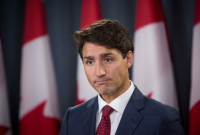Support strong Canadian climate journalism for 2025
As physicians working at the intersection of the health of people and the planet, we were delighted to see the National Health Service (NHS) in the United Kingdom committing to reaching net zero by 2040, with an ambition to achieve an 80 per cent reduction in its carbon footprint by 2028 to 2032.
What has kept the U.K. driving forward with life-saving work on climate change, the biggest health threat of the 21st century, in the middle of the pandemic? The answer is: the United Kingdom’s Climate Change Act.
The act, adopted in 2008, provides an overarching framework for the country’s work on climate change that guards against the human tendency to prioritize near-term crises over the prevention of long-term catastrophe. It requires parliamentarians to set legally binding carbon budgets to act as stepping stones, one every five years, taking the U.K. towards its 2050 target. These are decided upon 12 years ahead of time.
The U.K.’s greenhouse gas emissions dropped by 43.8 per cent between 1990 and 2019. Canada’s went up by 21.4 per cent. Canada has made dismal progress on climate change for so long, that it’s almost as though we don’t believe success is possible. It is.
There's no pill that can fix our atmosphere; what we need as doctors to protect people's health is better policy. Happily, there’s a bill on the docket right now on climate accountability, Bill C-12, which is our best chance of a “made in Canada” climate change act.
In the U.K., a body of scientific and health experts with their own secretariat and climate-modelling ability has been crucial to the success of its climate change act. So far in Canada, we have assembled a stakeholder group reporting to the environment minister. Bill C-12 would be strengthened by stipulating an independent scientific expert body that reports to Parliament to ensure it is immune from political retaliation. In future budgets, we will be looking for funding for staffing that will enable the analytical capacity to determine whether climate targets will be met with proposed policies.
More explicit alignment with the United Nations Declaration on the Rights of Indigenous Peoples (UNDRIP) would also be an improvement. Indigenous Peoples’ knowledge is essential expertise.
We applaud the Senate for having done a re-study of the bill, and encourage efficient deliberations so that no time is lost moving the legislation forward. Our new climate target of a 40 to 45 per cent emissions decrease by 2030 compared to 2005 levels increases the urgency to ensure this framework legislation passes before the summer recess.
We’ve seen what an effective law can do: in the U.K. health-care sector, binding carbon budgets spurred world-leading improvements in efficiency. Emissions from the NHS decreased by 18.5 per cent between 2007 and 2017, while clinical activity levels increased. The NHS has now published a 70-page, well-resourced plan outlining how it is going to get to net-zero by 2040. In Canada, we didn’t even measure the carbon footprint of our health-care system until 2018.
Our experience as physicians who have cared for people from coast to coast to coast is that Canadians are brave and funny and intelligent, and care deeply about the health of their children. We don’t need to be better people to start winning on climate. We need better policies — now.
A report just released by the Canadian Institute for Climate Choices shows that, although we will continue to warm until at least mid-century because of greenhouse gas emissions already in the atmosphere, only 20 per cent of health authorities have done climate vulnerability assessments to help adapt to floods, wildfires and heat emergencies. Meanwhile, decreasing air pollution and greenhouse gases saves lives. On a pathway consistent with net zero, the societal health burden from air pollution could fall from $8.3 billion in 2015 to $0.7 billion to $1.7 billion per year by 2050. Reducing emissions is good for economic as well as human health.
We were happy to see recently that, in accordance with the call to action from the health community led by the Canadian Association of Physicians for the Environment (CAPE), near-term targets were added to Bill C-12.
Flattening the greenhouse gas emissions curve is as critical to a healthy population, as is bending the curve on COVID-19 infections. Our kids have taken care of us through COVID-19, one of our biggest health threats. Adults must now protect adult and child health from climate-related risks with the heart and resolve of youth — starting with passing a strengthened Bill C-12.
Dr. Courtney Howard is an emergency physician in Yellowknives Dene territory, a clinical associate professor in the Cumming School of Medicine, University of Calgary, a community research fellow in planetary health at the Dahdaleh Institute for Global Health Research and past president of the Canadian Association of Physicians for the Environment.
Based in Montreal, Dr. Claudel Pétrin-Desrosiers has completed her training as a family doctor and is currently doing a master's in environment and sustainable development at University of Montreal. She sits on the board of the Canadian Association of Physicians for the Environment and chairs its Quebec regional chapter.







Comments